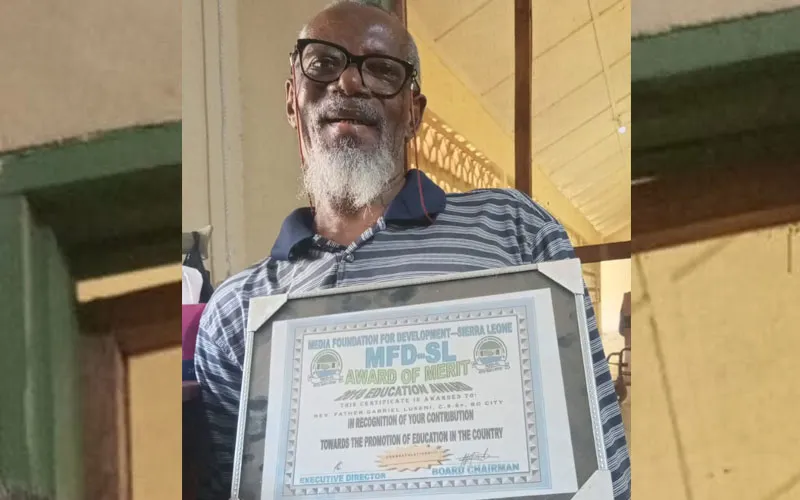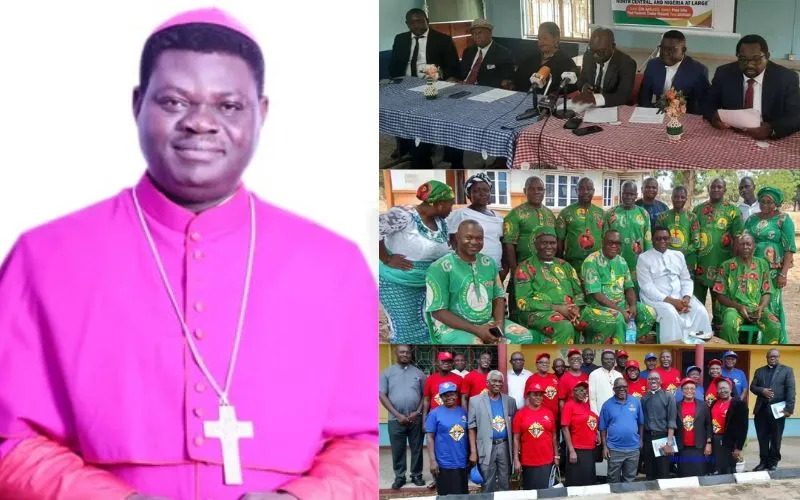He added, “Sitting down, looking at television was no longer enough for me given that I had been a very vibrant man, attending meetings all over the world as Superior of my Congregation. I started reading books, and from reading, I asked myself how I could continue contributing to the Church.”
Having worked as a lecturer in university, with deep knowledge about the Church, Fr. Gabriel started writing poems, reflections and short stories, before he wrote his first book, “Lion Mountain: A Story of Love, Conflict, Forgiveness and Reconciliation”.
Hugging the horizon on your way from Bo city to Sierra Leone’s capital, Freetown, are scenic mountains that take the shape of lions. There is a story of visitors who came up with the name “Lion Mountain” when they heard thunder while approaching the mountains and thought it was lions roaring. Translated, ‘Lion Mountain’ is ‘Sierra Leone’, hence the name of the west African country.
Fr. Gabriel’s debut book published locally in 2014 is the story of a boy who wishes to know what happened to Sierra Leone, having been away during the 11-year civil war that ended in 2002, reportedly leaving over 50,000 people dead, and immeasurable destruction.
Fr. Gabriel told ACI Africa that he never experienced the war and so, he assumes the mythical figure of the little boy who asks another character, ‘The Man of Great Age’ what transpired while he was away.
(Story continues below)
The 54-page book is a narration about Sierra Leone, making a generous use of poems and reflections. It is a book for peace and conflict resolution and is recommended for social workers, university students, leaders and “anyone interested in the history of Sierra Leone.”
Fr. Gabriel’s second book, ‘Weep Not Mama Salone’, also locally published in 2015 is a cry of Sierra Leoneans who have left the country and are still leaving for various reasons. Those leaving, the Catholic Priest says, face many dangers on the way, having to go through a desert, the Mediterranean Sea, before they reach their destinations.
The third book, the ‘Oracles and Dreams of Bintumaniland: An African Divine Comedy’ is the story of an African teenager married off to a man twice her age and experiences childlessness for years. She manages to conceive after visiting the ‘god of fertility’, and promising to give her child away to serve at the shrine. It is only after giving birth that the woman realizes that she made a promise she could not keep.
The book is both a cultural and religious story, the author says, and explains, “It makes you think of Abraham who was called to be God’s friend and was later required to make a huge sacrifice. It is also of a person in a midlife crisis, someone desperate for a way out. It is divine comedy and the comedy is making a promise you know you know you can’t keep.”
Published in 2016, the book addresses the challenges of the girl child in Sierra Leone, of young people being married off at a tender age. “Now, there is a law that seeks to protect young girls. Before, a girl child would be given to a marriage partner at birth. They did not have an opportunity to go to school. But things are looking up now. In fact, we can already see the fruits of this empowerment since in the last national examinations, the first two positions were scooped by girls.”
In ‘Come Follow Me: An African Model of Priestly, Religious Formation’, Fr. Gabriel suggests “human formation” into “a good human being” of Seminarians and others in Religious Life. Published locally in 2018, the book is based on the traditional idea of formation and is based on the research that Fr. Gabriel conducted 13 years ago while he taught in the Seminary.
The Catholic Priest suggests that the family gets involved in the Religious formation of their child through various ways of accompaniment. “It’s not like you are losing your child to the Church. Be there with them. Involve them in family activities and let them give their contributions as far as their Religious congregations permit.”
Fr. Gabriel also advises families not to put financial strain on their children in formation, saying, “Asking them to always give you money will affect their formation. This is why you find some Priests misappropriating Church resources because they are forced to support their families.”
The Priest’s latest book, “The Hurricane: The Story of Corruption and Accountability in Sierra Leone”, was published in 2021 by the Sierra Leonean Writers Series and can be bought from Amazon at USD20.
Launched in April this year, the 109-page book is divided into nine chapters and a postscript and is designed to highlight the issues of corruption, accountability, and the failure of the state leadership in Sierra Leone.
Fr. Gabriel decries the rootedness of graft in Sierra Leone, saying, “Corruption is endemic in this country; from a newborn child to a dying man. Parents pay for their children to pass exams. An old man, lying on his death bed parts with some money to get medicine.”
In chapter nine, for instance, Fr. Gabriel suggests the cultivation of “a national moral conscience through a civic re-education for all Sierra Leoneans” as the permanent solution to the challenge of corruption and the lack of accountability in Sierra Leone.
In the October 28 interview with ACI Africa, the Catholic Priest who had developed an interest in Sierra Leone’s socio-political life in his writing admits he has not made up his mind on what he intends to write about next.
What he knows, he says, is that he intends to collect his poems that are “all-over the place” and to make them into a book.
In his message to Sierra Leoneans as the country edges close to the general elections slated for June next year, Fr. Gabriel says, “Let’s have a peaceful, fair and democratic election. We should not forget that we are brothers and sisters united in various ways including inter-tribal marriages.”
“Let politics not separate us. Spouses should not be punished because they voted for a different political party,” the Spiritan Priest says.
Agnes Aineah is a Kenyan journalist with a background in digital and newspaper reporting. She holds a Master of Arts in Digital Journalism from the Aga Khan University, Graduate School of Media and Communications and a Bachelor's Degree in Linguistics, Media and Communications from Kenya's Moi University. Agnes currently serves as a journalist for ACI Africa.








